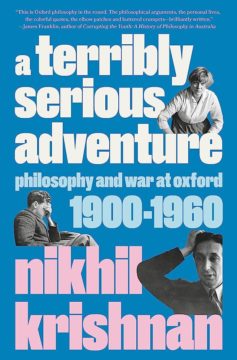Jennifer Szalai at the NY Times:
 When setting out to write “A Terribly Serious Adventure: Philosophy and War at Oxford, 1900-1960,” Nikhil Krishnan certainly had his work cut out for him. How to generate excitement for a “much-maligned” philosophical tradition that hinges on finicky distinctions in language? Whose main figures were mostly well-to-do white men, routinely caricatured — and not always unfairly — for being suspicious of foreign ideas and imperiously, insufferably smug?
When setting out to write “A Terribly Serious Adventure: Philosophy and War at Oxford, 1900-1960,” Nikhil Krishnan certainly had his work cut out for him. How to generate excitement for a “much-maligned” philosophical tradition that hinges on finicky distinctions in language? Whose main figures were mostly well-to-do white men, routinely caricatured — and not always unfairly — for being suspicious of foreign ideas and imperiously, insufferably smug?
Krishnan, a philosopher at Cambridge, confesses up front that he, too, felt frustrated and resentful when he first encountered “linguistic” or “analytic” philosophy as a student at Oxford. He had wanted to study philosophy because he associated it with mysterious qualities like “depth” and “vision.” He consequently assumed that philosophical writing had to be densely “allusive”; after all, it was getting at something “ineffable.” But his undergraduate tutor, responding to Krishnan’s muddled excuse for some muddled writing, would have none of it. “On the contrary, these sorts of things are entirely and eminently effable,” the tutor said. “And I should be very grateful if you’d try to eff a few of them for your essay next week.”
more here.
